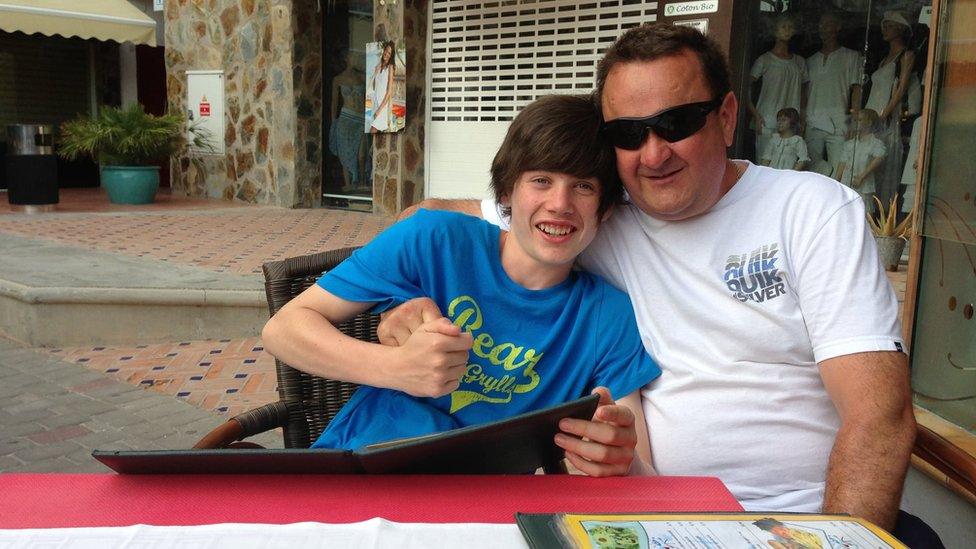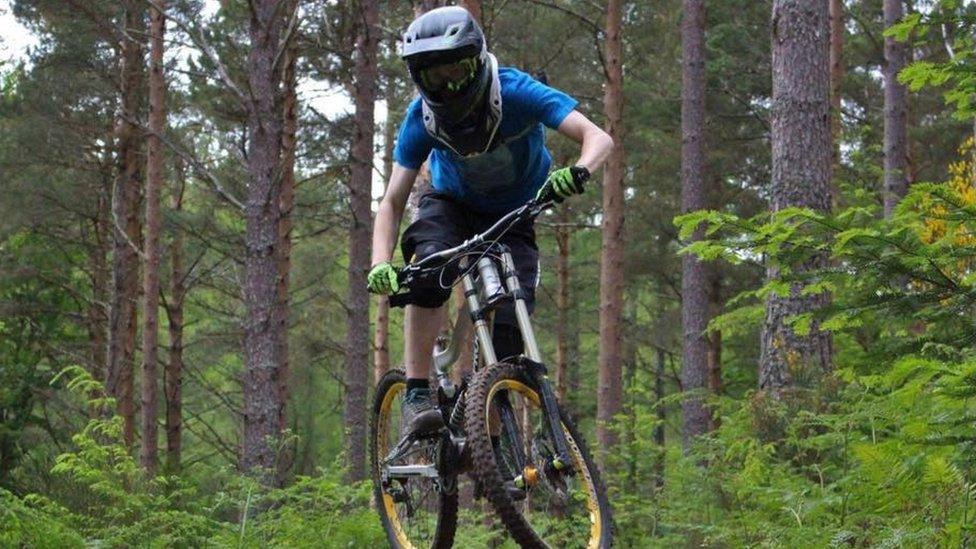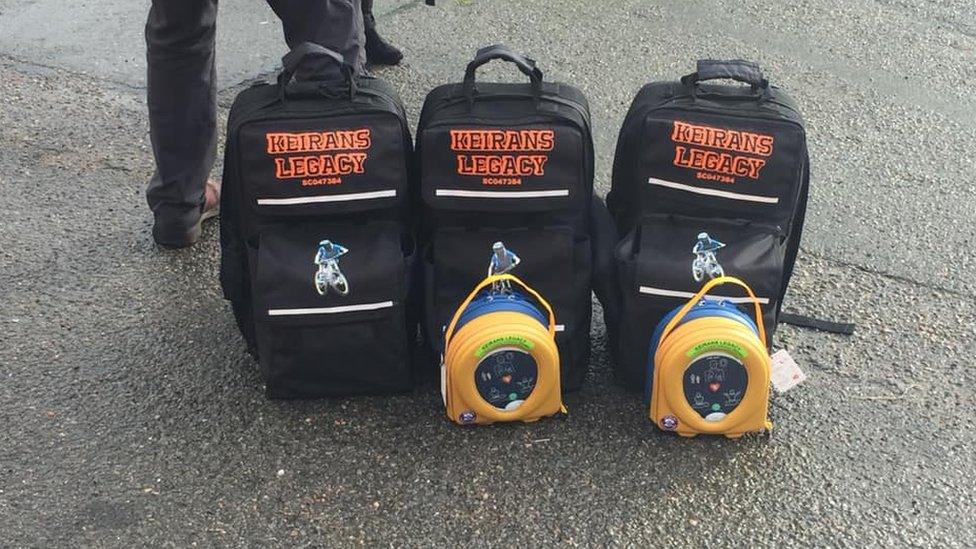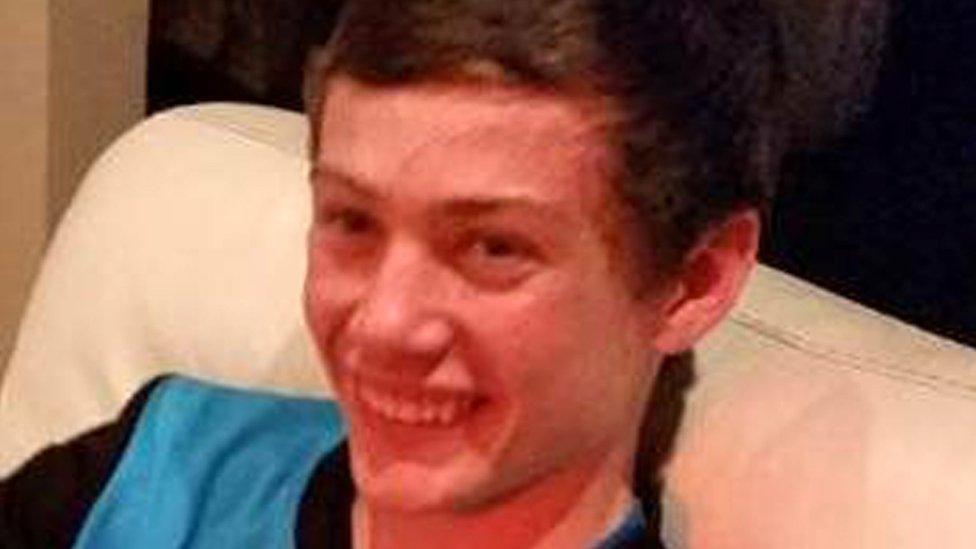Crash victim's family donate defibrillators to all road policing units
- Published

Keiran's Legacy, run by Gordon McKandie and his wife Sandra, has saved nine lives with defibrillators donated in the teenager's name
The parents of a 16-year-old cyclist who was killed in a car crash have donated a further 56 defibrillators to all Scottish road policing units.
Keiran McKandie, from Elgin, died at the scene of the smash on the B9010 Forres to Kellas Road in 2016.
Police officers who were first to arrive had no life-saving equipment.
Keiran's parents Sandra and Gordon set up the charity Keiran's Legacy and have since fundraised to buy more than 200 defibrillators.
The equipment gives a high-energy electric shock to the heart of someone who has suffered a cardiac arrest to restore the heart's normal rhythm.
As well as donating defibrillators to community groups, 24 have already been given to road policing units in the North East and Highlands and Islands.
The latest donation, worth £80,000, will see a rollout covering fast-response vehicles across all other police divisions.
Sandra McKandie told BBC Scotland's Drivetime programme: "There are a few things that could be improved with the education side, people frightened to help, and also the lack of equipment and nowhere to get it.
"So obviously if these public access defibrillators are available, people are educated and your emergency response team respond appropriately and quickly in a different manner, then people's chance of survival will be greatly enhanced."
Keiran's Legacy has so far deployed more 220 defibrillators in his name. To date, they saved nine lives and nearly 2,000 people have been trained to use them.
Mrs McKandie said she saw it as her mission to use Keiran's memory to save lives.
"He's very much the focus of everything that we do and always will be forever and ever, and this is his way of making a difference, affecting change and saving people's lives."

Keiran McKandie was a keen mountain biker before his death in 2016
'Eternally grateful'
Maclean Macleod had just finished training with Findhorn Coastal Rowing Club when his heart stopped suddenly in April and he was saved by his teammates who used a nearby defibrillator.
It had been donated by Keiran's Legacy and he said he would be "eternally grateful" to Mr and Mrs McKandie.
More than 3,000 people in Scotland, external experience an out-of-hospital cardiac arrest every year.
On the day of his cardiac arrest, Mr MacLeod said there had been no warning or any signs to suggest there was something wrong.
After a round of high-intensity sprints in the water, the rowers had come to shore.
"All of a sudden, I felt perfectly at peace with the world.
"I saw this lovely blue light in the background and that's the last thing I remember."
The club's captain was a trained first responder and quickly realised that Mr McLeod had gone into cardiac arrest.
Along with another teammate, they started CPR on his chest straight away.
"They opened up my clothing and starting pumping my chest, they were doing that for almost 20 minutes and that's a long slog by any standards," he added.

Keiran's Legacy has previously donated 24 defibrillators which are in use in road policing units in the North East and Highlands and Islands
Some defibrillators are locked with a keypad entry system and can only be opened with a code, which can be obtained by phoning 999 if the defibrillator is registered.
Keiran's Legacy is no longer putting out defibrillators that require a code to avoid a "potential delay" to using the device.
Mr MacLeod said that although the defibrillator was only 70 metres away from him, it took a while to find the code. Once it was found, it saved his life.
He said: "The defib was put onto me and it fired up and on the third cycle of shock, it actually gave me my life back.
"The defibrillator is why I'm here today and because of the rowers, I don't want to underestimate their part, but without the defib, they would've had to give up."
Mr MacLeod added: "I'm eternally grateful to Gordon and Sandra for all their work, particularly citing it so close to where we were."
- Published22 March 2016
